JIU Josai International University

To expand nighttime tourism, courses to develop tourism management personnel are being offered
Regional cooperation
2025.03.11
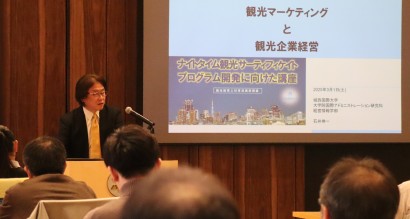
Professor Ishii giving a lecture
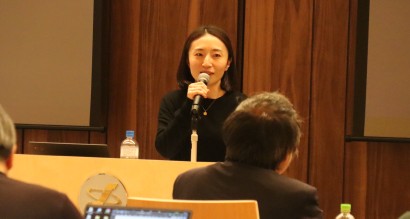
Guest teacher Kana Ito
A two-day course on March 1st and 2nd, "Course for Developing a Nighttime Tourism Certificate Program," was held at the Tokyo Kioicho Campus for people who live or work in Tokyo. 29 people, including those working in the tourism and travel industries, participated in the course. The course was organized by Faculty of Management and Information Sciences, and this year the course was delivered by Professor Shinichi Ishii, Associate Professor Takekuni Kurosawa, and Associate Professor Goro Komatsu, who are from Faculty of Management and Information Sciences and the Graduate Graduate School of International Administration respectively.
On the first day, the participants attended a lecture entitled "Tourism Marketing" on experiential tourism products and cutting-edge tourism, as well as a lecture entitled "Tourism-Related Corporate Management" by guest lecturer Kana Ito of Mori Building Co., Ltd.'s Town Management Division, where participants learned about corporate strategies in the tourism industry. Participants were given an introduction to the facilities in the Toranomon Hills area, which Ito is in charge of, and an explanation of the nighttime economy (economic activity that utilizes the time period from evening to late night), while touring the facilities. After touring the Toranomon Hills area, including "TOKYO NODE" and "Oval Plaza," each group was assigned a problem-solving theme and explored ideas for expanding inbound tourism.
The Shimbashi and Toranomon area is characterized by a population that drops to one-fifteenth of its daytime population at night, as it is primarily a business area. Ito said, "Attracting customers at night and on weekends, and encouraging people to move around the area are issues," and asked the participants to "think of ideas to promote movement with a view to utilizing the nighttime tourism resources of the city center."
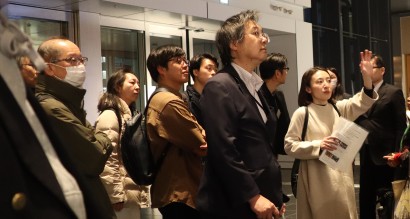
Mr. Ito, guiding the fieldwork
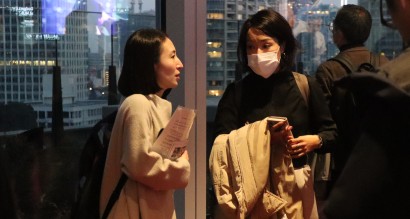
Participants enthusiastically asking questions to Mr. Ito (left)
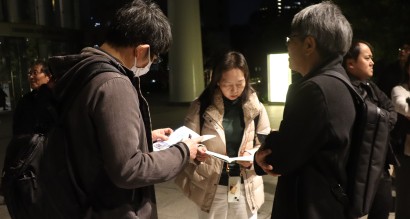
Participants discussing the fieldwork theme
On the second day, participants were given an explanation of nighttime tourism in New York through on-site and online broadcasts, covering the current situation during peak times when the city is crowded with people, employment issues, the latest entertainment news, etc. Participants were able to deepen their understanding by asking questions to the local staff.
After that, based on the fieldwork on the first day, each group analyzed and considered the issues, and then gave a presentation. It was clear that the participants were listening intently to the presentations of the other groups.
Finally, the participants were given a lecture on the basics of data science and participated in group work, which seemed to have led to further learning for the participants. Participants commented, "Through the field work and virtual tours, I was able to reaffirm the importance of nighttime tourism content," and "Throughout the two days, I realized that there is still room for development in nighttime tourism not only in Tokyo, but throughout Japan."
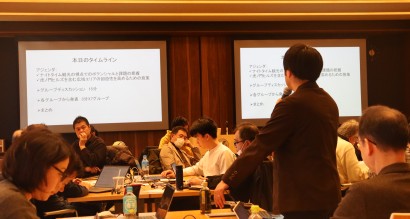
Participants giving presentations
This course has been selected for the Tokyo Metropolitan Government's "Tourism Management Human Resources Development Project in Collaboration with Universities and Other Institutions," and over the next three years will aim to develop the next generation of tourism management talent who will be responsible for promoting nighttime tourism in Tokyo.
It is planned to hold 12 lectures from next year onwards, and details will be posted on our university's website once they are decided.